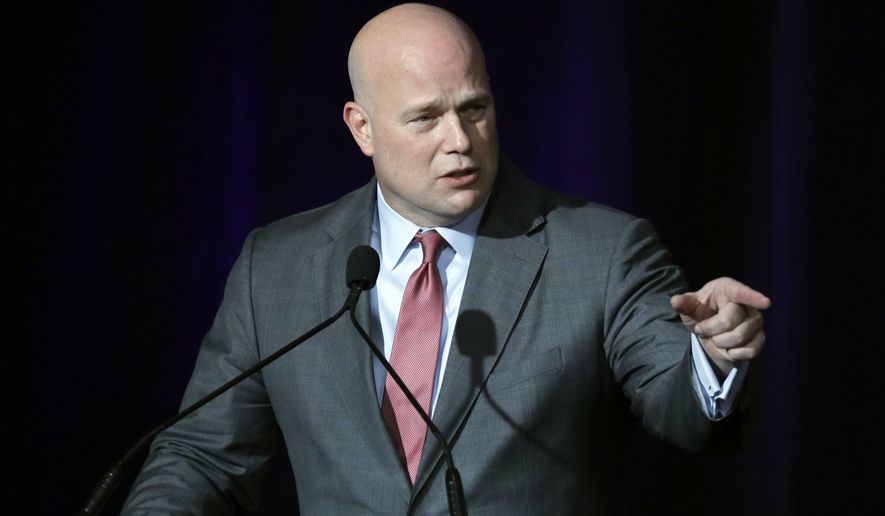After a day of posturing, Acting Attorney General Matthew Whitaker and the House Judiciary Committee came to an understanding that paves the way for him to show up and testify Friday.
Judiciary Chairman Jerrold Nadler had put the appearance in jeopardy after he led the panel in approving a subpoena to compel Mr. Whitaker to appear and to answer questions about his interactions with President Trump.
That upended weeks of tricky negotiations and Mr. Whitaker’s agreement to appear voluntarily — and, for a time, appeared to have pushed the Justice Department to cancel Mr. Whitaker’s appearance. The department argued that Mr. Whitaker was ready to show up, but couldn’t be forced to testify about communications with the president, which might be protected by privileges.
Mr. Nadler relented Thursday evening, saying that he would consider Mr. Whitaker’s objections to answering some questions on a case-by-case basis.
With that nod, the Justice Department said Mr. Whitaker would show.
“In light of that commitment, acting Attorney General Whitaker looks forward to voluntarily appearing at tomorrow’s hearing and discussing the great work of the Department of Justice,” said spokeswoman Kerri Kupec.
Mr. Nadler had never served the subpoena, but had asked his committee to have it ready in case Mr. Whitaker became evasive.
Mr. Whitaker was to be the first major controversial administration figure to appear before the new Democratic majority.
Democrats have a list of questions to fire at him — which they provided him last month — including whether he was in the loop before Mr. Trump ousted former Attorney General Jeff Sessions, why Mr. Whitaker didn’t recuse himself from overseeing the special counsel Russia probe, and what Mr. Whitaker’s interactions have been with the president since taking office.
The Justice Department said in a Thursday letter that Mr. Whitaker was poised to testify that the White House never asked for any commitments about the Russia probe, nor did Whitaker make any.
He was also prepared to testify about the ethics review that said he didn’t need to recuse himself from overseeing the probe.
But he would not testify about communications with Mr. Trump.
The department said if there were areas the committee wanted to pursue but Mr. Whitaker balked at, the traditional process — upheld by courts — is to negotiate, and only later to issue a subpoena.
The standoff had threatened to become a major constitutional clash.
If the committee feels wronged, its chief recourse is to hold Mr. Whitaker in contempt. That vote would have to be approved by the whole House, and then usually would be turned over to the Justice Department to decide whether to enforce the subpoena.
That’s what happened when former Attorney General Eric H. Holder Jr. was held in contempt by the GOP-led Congress in 2012. Mr. Holder’s Justice Department declined to take any action, effectively shielding him.
The hearing with Mr. Whitaker is all the more striking because he could be out of the acting attorney general’s job next week. The Senate could vote to approve President Trump’s nominee, William P. Barr, within days.
Mr. Whitaker, who had been chief of staff to Mr. Sessions, was appointed by Mr. Trump to take the acting attorney general’s job ofter Mr. Sessions resigned, under pressure, in November.
Mr. Sessions had recused himself from overseeing the Russia investigation, leaving Deputy Attorney General Rod Rosenstein in charge.
With Mr. Sessions’ departure, Mr. Whitaker took over supervision.
Republicans on the House Judiciary Committee said Thursday that the subpoena for Mr. Whitaker was an early overreach by the new majority.
“A subpoena should only follow the breakdown of an accommodation process, and as a last resort against persons seeking to frustrate the legitimate oversight of this committee. There has been no breakdown here,” said Rep. Doug Collins, the ranking Republican on the panel.
Since Mr. Rosenstein was in charge for most of the Russia probe’s time, Republicans demanded he also be added to the subpoena.
Democrats defeated that, then approved the Whitaker subpoena on a 23-15 vote.
• Stephen Dinan can be reached at sdinan@washingtontimes.com.
• Jeff Mordock can be reached at jmordock@washingtontimes.com.




Please read our comment policy before commenting.